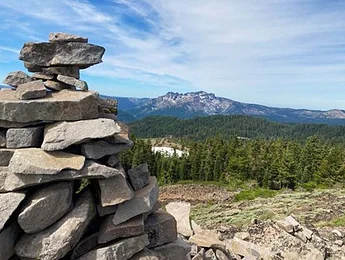Pine Ridge-Summit Fuelbreak Maintenance Project - COMPLETED April 2024
Sierra Nevada Conservancy launches new grant programs, funds $2.1 million in projects

At its March quarterly meeting, the Sierra Nevada Conservancy Board approved new grant guidelines for its upcoming Vibrant Recreation and Tourism Program, as well as its Strategic Land Conservation Program. It also awarded more than $2 million in funding for projects focused on restoring forest health, making communities more resilient to wildfires, and boosting recreation and tourism.
New vibrant recreation and tourism and strategic land conservation grant guidelines
“Today, our board approved grant guidelines that will allow us to continue to effectively get funding into the hands of partners who complete the hard work necessary to conserve our vital natural lands and expand viable economic opportunities for our rural communities,” said Angela Avery, executive officer at the Sierra Nevada Conservancy.
The newly approved guidelines for the Vibrant Recreation and Tourism and Strategic Land Conservation programs are vital directives of the Sierra Nevada Watershed Improvement Program, a large-scale, holistic effort to restore resilience to forested landscapes and communities throughout the Sierra Nevada. The programs will allow the Conservancy to award a minimum of $10.45 million in the first grant cycle to projects and plans that boost recreation and tourism in the region and conserve natural and working lands. The funding is part of the state’s historic $15 billion investment focused on protecting Californians from the effects of climate change, including wildfires, drought, and extreme heat.
More information on the grant programs will be posted on the SNC Grants page in late March.
Projects funded target wildfire resilience, recreation access, and boosting economies
At the meeting, the board also awarded $2,110,495 to seven different organizations to help boost Vibrant Recreation and Tourism, Forest and Watershed Health, and Resilient Sierra Nevada Communities.
“I was also glad the board approved the recommended projects, especially after back‑to‑back devastating wildfire seasons, since these efforts ideally help to restore healthy forests, make communities more resilient, and boost recreation and tourism in the Sierra Nevada,” added Avery.
To help boost recreation and tourism in an area devastated by the Dixie Fire, the board awarded the Sierra Buttes Trail Stewardship $259,407 to construct 8.3 miles of multi-use trail just south of the town of Portola. Called the “Beckwourth Recreation Project,” it will provide additional easy-access recreational opportunities for local residents and visitors to eastern Plumas County. A grant in the amount of $370,443 was approved for the Eastern Sierra Council of Governments to put together a plan to create a multi-use network of trails that will connect several towns in Alpine, Inyo, and Mono counties.
Under the Forest and Watershed Health Program, board members awarded $405,605 to the Calaveras County Resource Conservation District for the “Pine Ridge-Summit Fuelbreak Maintenance Project” and another $75,040 to the American Indian Council of Mariposa County for its “Sarah Priest Fuel Reduction Planning Project.” The funds for the Sarah Priest project will be used by the Southern Sierra Miwuk Nation to complete necessary surveys and analysis of a 68-acre fuel-reduction project northeast of Mariposa. The Pine Ridge project will widen and strengthen a critical fuel break installed near Railroad Flat and West Point during the 2015 Butte Fire.
Also, in the Resilient Sierra Nevada Communities Program, the board gave the green light for three separate grants. The first was a grant for $245,321 to Chico State Enterprises to utilize existing fire-management programs to advance fire-planning education and training across several community colleges in the area. Another was to the Sierra Business Council for its Blue Mountain Electric Project. The $400,000 grant will fund construction of key components of a new forest biomass plant in Wilseyville in Calaveras County that will provide jobs and create energy from biomass taken from fuel-reduction projects and wildfire burn zones. The last grant of $354,679 was awarded to the Mooretown Rancheria of Maidu Indians of California to conduct a cultural-resource survey of the Feather Falls Scenic Area that lost trails, bridges, an overlook, and all recreation facilities to the North Complex Fire.
A full list of projects and recipients can be found in the Board Meeting Materials.

